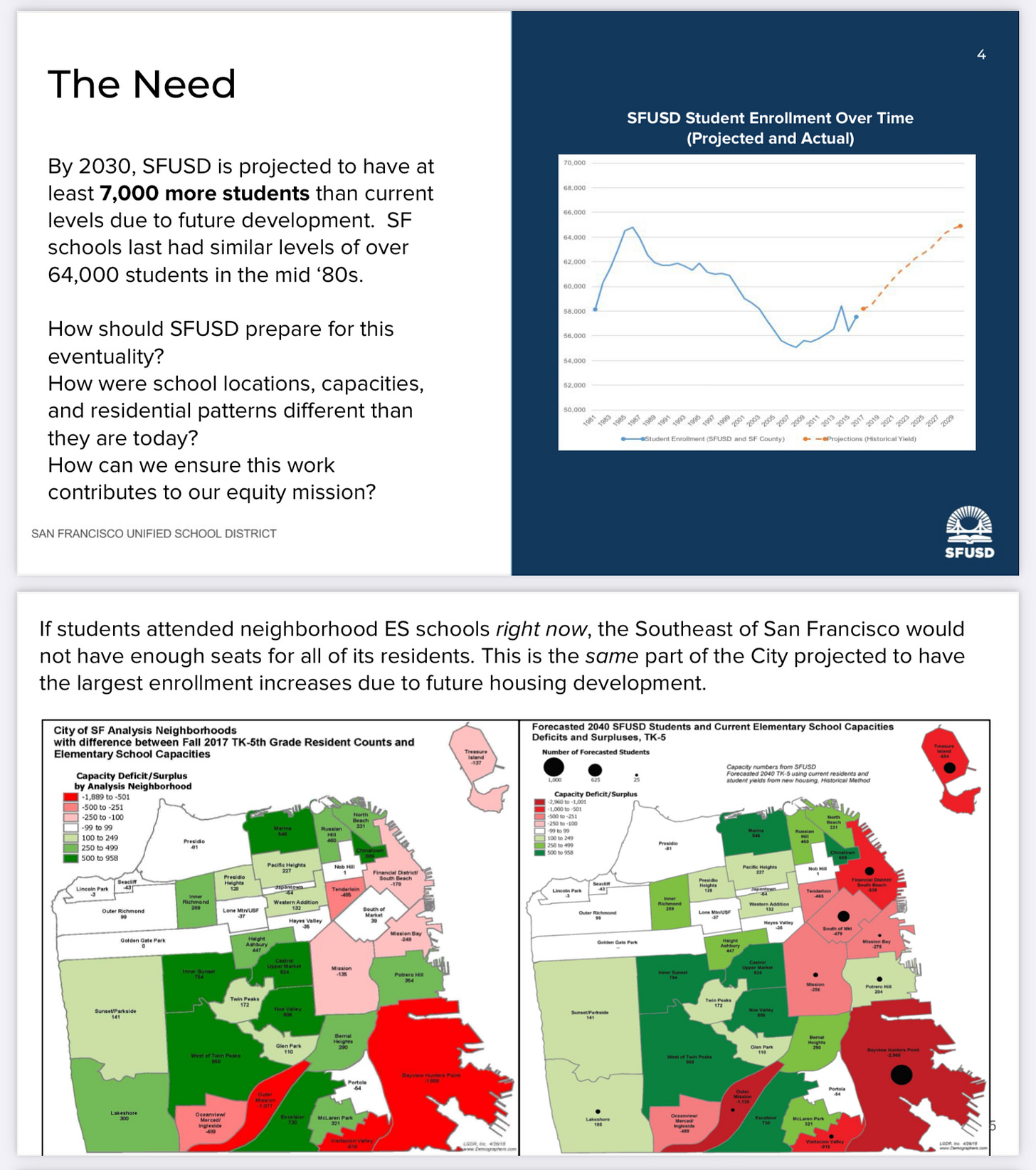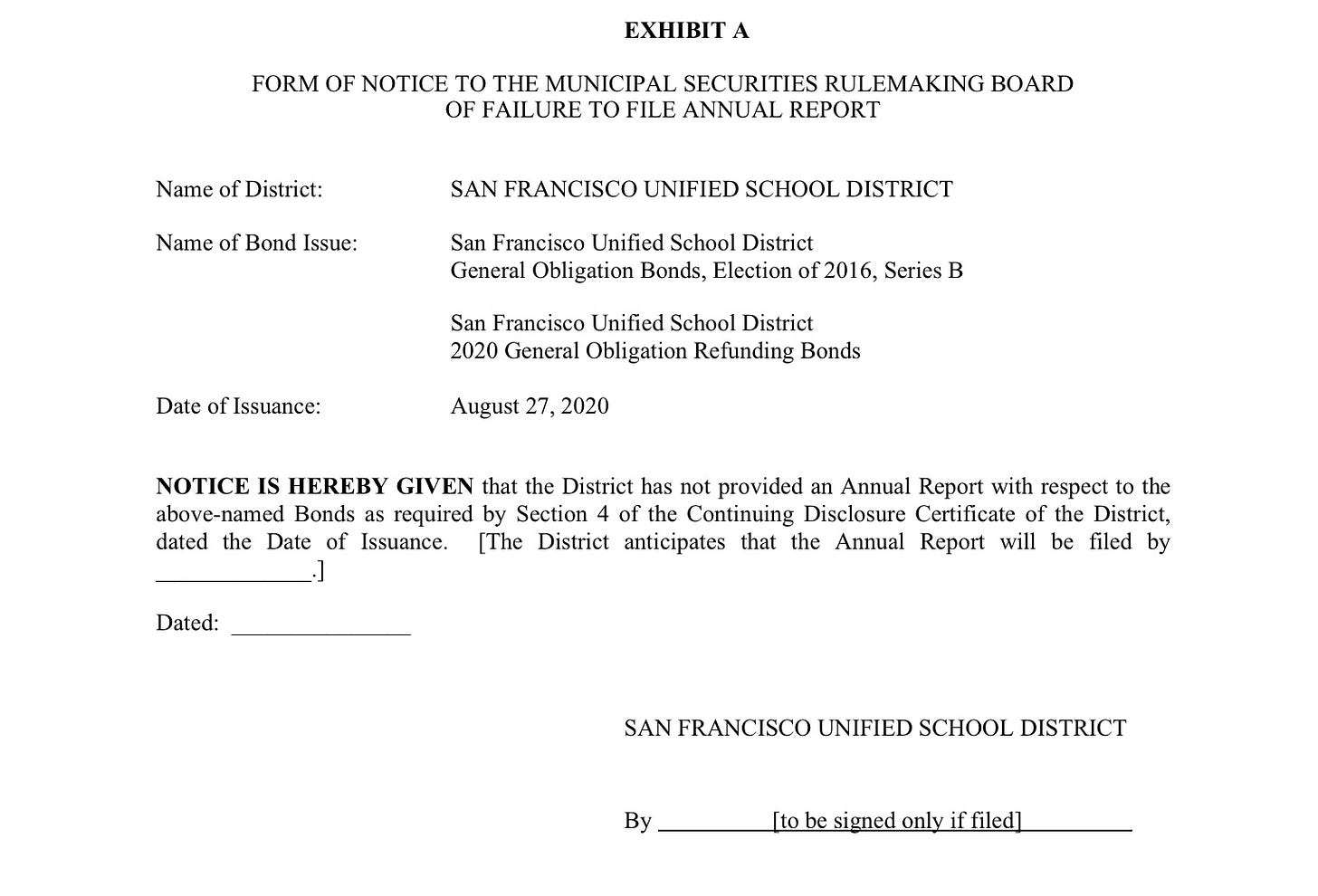Part of a multi-part series on facilities bond spending. Part 2: Promises are just words
Shavonne Hines-Foster, former San Francisco Board of Education (SFBoE) student delegate, perked up and spoke to amplify a public comment at the April 6, 2021 Board Meeting, “For me as a student who lives in Bayview, I definitely want to learn more about what's happening and what was said on public comment too.” In particular, the comment (55 minute to 1:01 timestamp) was that the San Francisco Unified School District (SFUSD) no longer intended to build a school in Bayview, as was part of the plan in the 2016 San Francisco Unified School Improvement Bond.
“My observation was that folks imaging (sic) their kids could go to the school,” stated Huyen “Kiki” Vo, in a 2020 interview. At least Vo and neighbors had been given hope recently, since he lived in Mission Bay. That Misson Bay elementary school project was again promised to be built, but had just been given another delay with a pushed back opening date in 2025. For Bayview, the funds for construction of a school were pushed as well, pushed off the table in sparsely attended SFBoE Buildings and Grounds Committee meetings in February 24 and June 30, 2020. There were no reasons asked by those SFBoE Commissioners in attendance, but those details are more than Student Delegate Hines-Foster received that April night.
A new school is really needed in Bayview, so plans are for Mission Bay
Multiple demographics studies commissioned by the SFUSD have projected the highest population growth in the City to be due to the new housing developments in the Southeast and Central East. One such report to the SFUSD Augmented Buildings, Grounds and Services Committee on June 25, 2018, also stated that those regions did not have sufficient classroom capacity back then. (Such projections have since proven to be optimistic.)
Figure 1. Slides by SFUSD staff explaining the areas most in need of new schools. Source: Presentation to Buildings and Grounds Committee, 6/25/2018.
Those reports indicated that new schools were needed in the 2 East regions, more so in the Southeast (dark red on slides), i.e. the Bayview neighborhood. However, most of the discussion from 2017 onwards was about the Mission Bay site. Maybe the Mission Bay site was just more amenable to making progress. Hard to know.
What is known is that the Mission Bay school had slipping deadlines and increasing budgets. At an earlier date, the expected construction cost was $55 million. In short, one thing after another brought us to today, with a recent Request for Qualifications for a design-build contract at an estimate of $90 million. A subsequent Request for Proposals was expected to be posted in June 2021.
Slipping deadlines and increasing budgets? Projects no longer to be funded for no given reason? These are the same people running the school modernization efforts. And these are the same people who disbanded the Citizens Bond Oversight Committee (CBOC), which was required by 2016 Proposition A and California state law, Education Code 15278. Criminally negligent or waay too much bother?
The whistleblower letter
Bond spending and committee membership were not on many people’s priorities with school renaming, a Parent Advisory Committee nomination, and Lowell High School lottery admissions occupying much of the SFBoE discussions in February 2021. But one insider did have enough and sent out a whistleblower letter to members of the media, City Attorney Dennis Herrera, and others. Among the concerns highlighted were unmonitored bond spending with lack of audits and lack of a CBOC. The SFUSD CBOC section of the website had no updated documents since 2017.
It was in 2017 that the then Chief Facilities Officer David Goldin retired. But the position was left unfilled for a year until the SFUSD hired Dawn Kamalanathan from the San Francisco Recreation and Parks Department. Goldin, who took over after a criminal conviction of a consultant for defrauding the SFUSD of $500,000, was a trained architect who managed the facilities funds from Propositions in 2003, 2006, and 2011. Kamalanathan, with a degree in Public Policy, had previously handled 2008 and 2012 Parks Bonds with the largest project the Northwest Wharf Plaza for $16.2 million.
“Clean audits,” but not approved
Pushing by public comments at several SFBoE Board Meetings as well as records requests finally elicited replies. At the April 6, 2021 Board Meeting, Deputy Superintendent Myeong Leigh, Kamalanathan’s direct supervisor, explained, “we have continued to have external audits produced every year. And I believe those have been approved and presented to the Board as well. And so that has continued to be the case. And we have had a very clean and strong track record of externally validated, clean audits for all of our bond proceeds.” (1 hour 5 minute timestamp) His words are backed up by General Counsel Danielle Houck, who reiterated the years of “clean audits.”
A few days later, the website was updated. The 2018 Bond Financial and Performance audits were posted, but without endorsement by a CBOC. The 2019 Bond audits were posted unsigned and marked with a big word across the pages “DRAFT.” A couple weeks further, the draft was replaced by an auditor signed version dated April 12, 2021, over a year after the auditing work.
Figure 2: A page of the 2019 Bond Performance Audit draft stating that there was no CBOC. Source: see text for hyperlink to folder.
Two audits appear only after records requests: the first is an unapproved audit from years back and the second is a draft audit without an auditor signature that mentions a lack of a CBOC (Figure 2). It is unclear if the audits for the year ending June 2020 and due April 2021 had yet been initiated. Such audits may be considered clean to certain parties, but the CBOC must review and endorse them.
Material misstatement to the SEC
In those many months of Fall 2017- Spring 2021, over $180 million goes out, and more money is needed from the public debt market. To obtain the next tranche of $280 million, a lot of paperwork must first be filed. On June 23, 2020, the SFBoE approved by 6-0 vote Resolution 206-23S01 related to such bonds, without question or comment. As part of that Resolution, an attachment named the Preliminary Official Statement had an Exhibit A stating that the SFUSD failed to file an annual report. This Official Statement, with its multiple pages of financials to reassure potential bond investors, further clearly states that the District established a CBOC.
The final version, approved by outside counsel Orrick, Herrington & Sutcliffe LLP and dated August 20, 2020, was sent out without changes to those sections. Professionals tell the author that that CBOC line is a material misstatement to the Securities and Exchange Commission (SEC). (For those keeping track, Commissioners Kevine Boggess and Matt Alexander are in the clear on this aspect as they were appointed in January 2021.)
Figure 3: Exhibit A of the Preliminary Official Statement seeking bomd funds states the SFUSD did not file an annual report.
Figure 4: Statement in the text of the Preliminary Official Statement that the District had a CBOC.
Citizen Oversight
The SFBoE has a regular part of every Board Meeting where Commissioners nominate citizens to various Advisory Boards and multiple Commissioners have done so. Lately though, Advisory Board membership has not being replenished quickly enough and voting quora are not possible except for holdovers extending beyond their appointment terms. Such is especially true for the financially related advisory board for Parcel Tax or QTEP. But no Advisory Committee was left to wither as extensively as the CBOC.
Two audio recordings of the former CBOC meetings reveal quite a bit more detail than can be covered in this post. In the August 2, 2018 CBOC meeting, multiple members brought up the fact that most of them were termed out. In the subsequent meeting, over a year later on August 9, 2019, the members figure among themselves that just one of them has yet to term out. Then Kamalanathan joins the discussion, declaring, “Because you don't really have a body right now. And so we can, you know, formally thank you for your service, and you don't have to come anymore. And we will, again, start putting forward recommendations to the Board of Education this fall.”
In that 2019 meeting, Kamalanathan said she would build up a new CBOC and already had two names in mind. Later in that meeting, she stated, “I aspire to have a best practice bond program.” Given the specialty jargon of the committee, she assents to the suggestion of architects or design professionals. The rest of that meeting is a cursory discussion of the 2018 audits with the auditor, but ends without a vote on acceptance.
Now two years of inaction later, after a whistleblower letter, Deputy Superintendent Leigh admits about CBOC at that same April 6, 2021 meeting, “And it is true, we have been out of compliance with this requirement.” (emphasis by the author) Later in the meeting, responding to questioning, he repeats, “We are out of compliance with this provision of the ED code.” That’s California Education Code 15278.
Kamalanathan, who earlier attributed the lack of a CBOC to the COVID pandemic, began advertising and recruiting in March 2021. She does so on her personal LinkedIn and her professional Instagram pages. But her text of the job description appears unusual in its emphasis and is better to quote without description.
“Want to influence the priorities of SFUSD’s current Bond program? Future planning for the November 2022 G.O. Bond? Consider joining the SFUSD Citizen’s General Obligation Bond Oversight Committee! The CGOBOC meets quarterly and provides feedback to the Chief Facilities Officer on priorities for the expenditure and programming of San Francisco General Obligation Bond funds. The CGOBOC also ensures accountability and transparency of Bond expenditures by reviewing and accepting annual audits of the Bond program…”
Soon after on April 14, a slate of 6 is proposed for CBOC, to be discussed and voted on at the April 20 meeting. Public comment, (starting at 3 hours 58 minutes) however, was virtually unanimous in panning the group. Reasons posited against the slate included insufficient diversity, too many at-large members against the By-Laws, and lack of following Board Policy 1220. Superintendent Vincent Matthews preemptively pulled the slate before a vote.
Another slate of 6, again put forth by Kamalanathan and without an architect, was approved at a Special Board Meeting on May 4. As of today, the new CBOC has had several meetings and has yet to accept the 2018 audits.
About that tax-free bond status
The key tenet in the whistleblower concern was that bond money was used for operations, in direct violation of the terms of the 2016 Proposition A and state law. When confronted in a March 29, 2021 Augmented Buildings, Grounds and Services Meeting, Kamalanathan denied that bond staff were used to count windows and do other reopening related tasks. At 1:27:45 timestamp, she states, “[I] want to assure folks we have not spent general obligation bond dollars on, again, operational expenses with school reopening.”
If receipts did prove the accusations to be true, the tax free status of the bonds could be revoked. Kamalanathan at the July 26 CBOC meeting admitted the action and promised to move about $170,000 of expenses to a different bucket of funds.
But this example was just the time they got caught. More in the next post.






